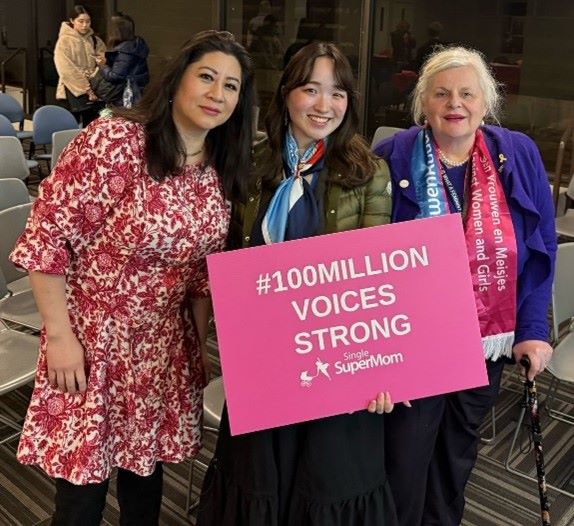On Thursday I prepared for a speech at the Single SuperMom event that evening. Besides that, I attended a Side Event in the packed conference room 2 about ‘attaining gender equality in our lifetime’. Cognizant that our minister of Emancipation, Mariëlle Paul, mentioned in her speech at the CSW69 that the speed in which gender equality is progressing at the moment, it will take another 134 years to attain it. Listening to the panel on the ILO (International Labour Organisation) hopes and struggles for gender equality in the workplace progress might not be that bleak, but slow it is, that is for certain.

The Single SuperMom event was pink. Pink banners, pink table cloth for the panel, pink capes for the volunteers to wear. That being so, I adapted to that colour, at the same time proclaiming my presence as representative of the Netherlands Women’s Council (NVR), by wearing my ‘stop violence against women and girls’ NVR-scarf.
Image: Selfie of Artemis wearing the ‘stop violence against women and girls’ scarf of the Nederlandse VrouwenRaad
An interesting discussion ensued in the panel, where the practical problems of the single mother were portrayed. Don’t think that a modern country like the Netherlands is really that better in taking care of single mothers and their children. Of the 540,000 single mothers in the Netherlands about 100,000 need assistance financially. However, the other 440,000 single mothers may not live in dramatic circumstances, they need assistance too in the form of better policies just as much as their less financially secure sisters.
Day Care accessibility in hours and costs, school weeks with study days for the teachers, school days that end at 3pm well before a work day ends, the costs of after school care, it all adds up to a constant worry about how to manage it all. I realise that households with two adults face these challenges too, even so, having a partner to balance your work and care life makes a big difference. Besides, did I really birth my daughters to hand them over from 7:30am to 6pm to others? Don’t children have a right to a parent that is more than that stressed out adult they see struggling with all the adulting and household tasks in the weekends?
Then there is the stigma of being a single mom. Whether as a divorcee or a widow, too many cultures even today ostracise women for no longer ‘having a man’. From India, where a divorced women is forced to live with her inlaws for the rest of her life, while being made ‘invisible’ by restricting her to the inside of the house. No trips outside the house for her. Even the marriage of her daughter she is not allowed to attend. Not everywhere in India the restrictions are so severe, but they do exist for too many women. In Korea and Japan, single mothers are considered, and treated as, inferior.
That is just their culture, right?
Well, even in the Netherlands single mothers receive the cold-shoulder. The stigma of being a divorcee (“she could not keep her man”) is pervasive, even nowadays in our own modern country. I experienced this myself as my mom was a single mom. Not a divorcee, but a young widow with children aged 1 and 6 years old. Nonetheless, often looked at askance as people assumed her husband had left her for another woman. Luckily for me and my brother, my mom was well educated. Additionally, the labour market was tight and thus she found work 6 weeks after becoming a widow. Being the extraordinary woman she was, she negotiated ‘half-time workdays’ with her direct boss and so her career of 30 years as a civil servant started with 21 and ¾ hours each day, 5 days a week, as the workweek was 43 hours in 1965. How did she manage us during her workhours in 1965, you might wonder? Surely there were no day care centers available then?
The answer is : her mother. She managed because my grandmother would take a tram and a bus from Rotterdam Bospolder/Tussendijken every workday, very early, to arrive at our home in Kethel, a suburb of Schiedam, not much after 7am. Grandma took care of me getting dressed for elementary school, took care of my baby brother, in order for my mom to ready herself for work. Grandma took care of everything but the cleaning, but it did include grocery shopping and cooking, untill my mother would return from work at 1:15pm to a cooked midday meal. This system of familial care continued until my brother reached the age of 8, as then his school hours ran to 12pm and I could supervise us both for that one hour until my mom returned home and I could cook that midday meal for us at age 13.
As a child I took this as ‘normal’. Only as an adult, I realised that my grandma took on this care task when already 68 years old! Next to this workday care by my grandma, my mom had assistance from two of her sisters. Together they made it work. Now, try to think of a woman without this familial support. In a labour market that is full of workers already. Being a woman with less than adequate education and work-experience. How different her life, and our life, would have looked then.
My story, here above, is not to elicit your sympathy, it is to impress on you that bad things happen to women, not through a fault of their own, and that includes not just widowhood but also divorce. Happenstance that pushes them to fend for themselves and their children. To give these women and these children a chance for a decent life and a future without poverty society needs to have laws and practices in place that assists them in making the best of a less than ideal situation. When next you vote, think of the laws that are needed for women, including these single mothers. When next you see a single mother, be kind and if possible offer a hand, even if just for one time.

A good thing came of this Single SuperMom event, as a Japanese woman told us of her plight, of the stigma of being a single mom in Japan. That got me thinking of the history of Japan, with kings, emperors, shoguns being military men. Military men have a tendency to die in battle. Which would leave their spouse a single mom. I wondered if all the widowed queens where given the same cold-sholder as nowadays Japanese women receive. I wondered whether the mythology of Japan has goddesses that lost their husband god. If so, and if these single mothers were not shunned, but perhaps even reveired, the answer to a Japanese culture change might lay in the retelling of their stories in modern day Japan.
Image: Isra Lee (Single SuperMom), Emiri Kaneko (SRHR Youth Alliance), Artemis Westenberg
The young japanese woman’s eyes lit up at my suggestion and we are going to explore this possibility further in the months to come. Retooling history and mythology might give cultures a chance to accept the reality of single mothers. Emiri and I believe it is certainly worth a try.


